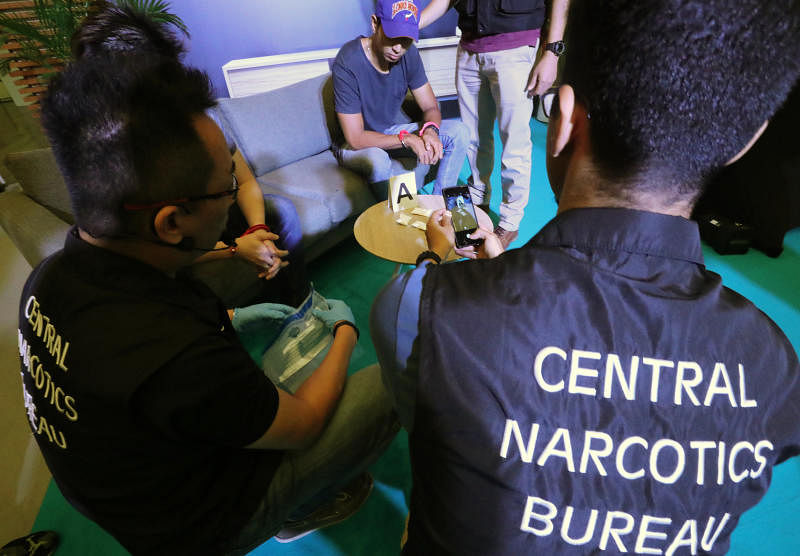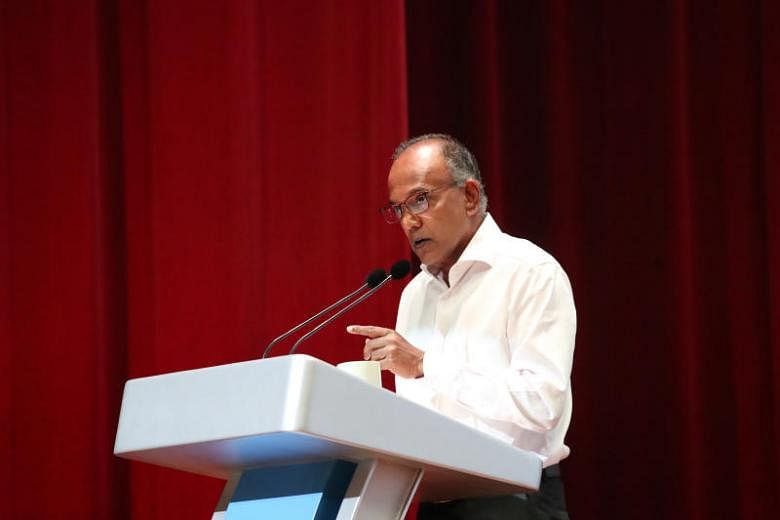SINGAPORE - Singapore must guard against the misperception of cannabis use portrayed by Western media, and continue educating its youngsters, many of whom obtain drug-related information from overseas media sources.
Law and Home Affairs Minister K. Shanmugam said on Friday (May 24) that one key challenge that Singapore faces currently is the increasing number of countries calling for alternative drug policies.
"There are very strong coordinated efforts internationally, as well as within Singapore, to change the Government's position on drugs, and to change public perception on drugs," he said.
However, those efforts are based not on science but on ideology.
"Our position is based on practical realities, common sense and evidence," he added.
Mr Shanmugam was speaking at the Central Narcotics Bureau's workplan seminar, where the agency showcased initiatives to help in its operations and outreach efforts.
He said that countries are seeking legalisation and decriminalisation of cannabis use, and to treat the issue as a health problem instead.
"Let us look at the evidence. Unfortunately, in today's world, perception matters far more than actual reality," he said.
In the United States, for example, public sector officials, researchers and non-governmental organisations (NGOs) that express misgivings about cannabis legalisation are characterised as being alarmist and backward.
"Even though these are the very people - the enforcement agencies, the NGOs - which are the ones picking up the pieces and dealing with the consequences of the problems," the minister said.
He said it is important for Singaporeans to be aware of the context in which other countries make their policies.
For instance, in the US and Canada, the legalisation of cannabis has led to Big Pharma, tobacco and alcohol companies chasing "the new gold rush" as they want to reap big profits.
"In the US last year, in one year, investors poured US$10 billion (S$13.8 billion) into the legal cannabis industry," he said.
He cited the example of cigarette brand Altria, the parent company of Marlboro, buying a 45 per cent stake in Canada-based cannabis company Cronos Group for US$1.4 billion.
The money is also finding its way to lawmakers, Mr Shanmugam said.
"Unlike Singapore, over in the US, you can lobby, you can pay money to the legislators. The cannabis industry and those who stand to benefit from its legalisation contributed US$2.5 million to lobby revenues in 2018," he said.
In May last year, the National Cannabis Industry Association organised a three-day lobbying tour to Washington to meet and lobby congressmen.
"This has meant that politicians become beholden to industry, and they are influenced by the companies that fund them," he said.
Cannabis, or marijuana, is also framed as a "green gold" that the US should cash in on, instead of losing the revenue to Canada.
Mr Shanmugam said that the framing and shaping of public perception by the media also play a part in the misperception of cannabis use, with the consistent message being that cannabis is benign, and actually beneficial.

He cited a US study which looked at the New York Times and found that after a sharp increase in the proportion of articles discussing the medical use of cannabis, the number of Americans supporting legalisation began to increase.
"This is a canard because there are certain medical uses for certain chemical components of cannabis and that should be prescribed in a hospital environment," he said.
"But it is a big jump from saying that taking or ingesting raw cannabis is going to help you. It is not going to help you if it is not being prescribed by a doctor to a specified patient for a specified illness," he added.
The minister stressed that the impact of social media and mass media overseas in spreading misinformation that normalises drug use cannot be underestimated.
Research showed that crime rates in Colorado rose faster than in other US states after marijuana was legalised.
"An 8 per cent increase in property crimes, especially where or near where the cannabis dispensaries are. A 19 per cent increase in violent crimes including homicides," he said. "We believe that being tough on drugs, imposing a deterrent penalty, actually saves more lives."
While such statistics are clear, they are ignored by big companies, lobbyists and politicians in the countries that legalised cannabis.
"We have to operate on evidence. We have to operate on what the research shows elsewhere. And not be confused by broad simplistic claims," he said.
In the face of such challenges from the global front, Mr Shanmugam said there has to be "preventive drug education, tough laws and effective enforcement and strategic international engagement".


